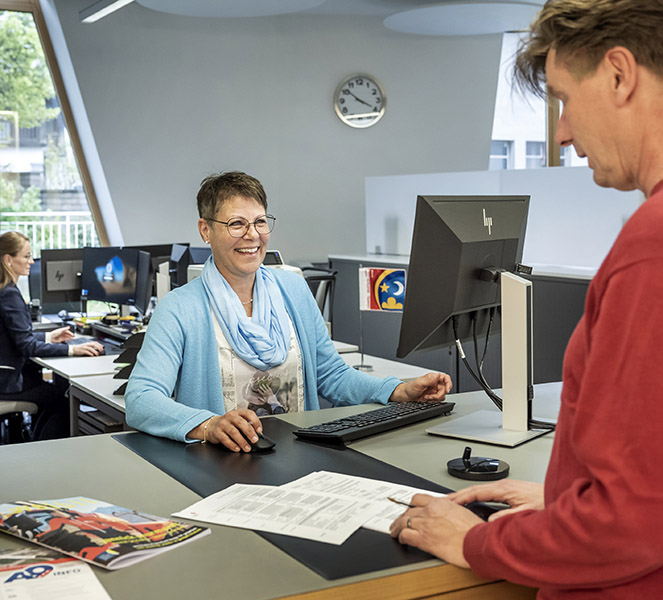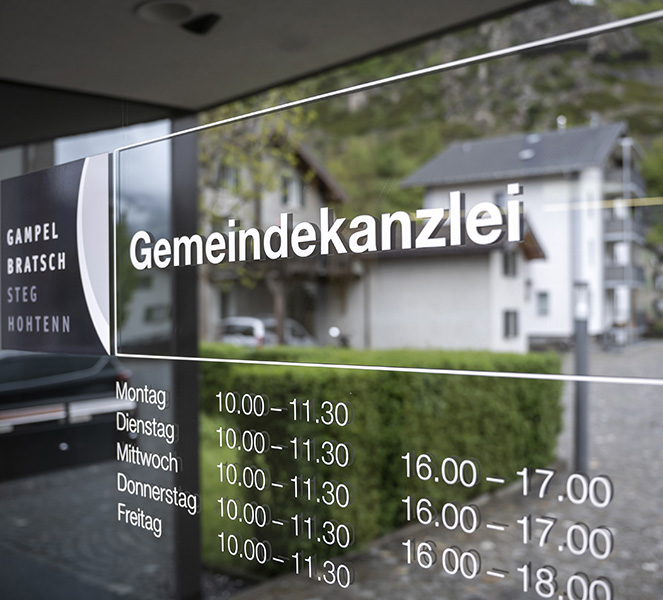Integrated IT solution and Dialog admin software
“The Swisscom and Dialog solutions work well together.”
The story in brief:
Today, the municipality of Gampel-Bratsch has an ICT infrastructure to be proud of. In a model pilot project, it has completed a full upgrade of its systems and implemented Dialog’s administration software.
Besides being home to one of Switzerland’s most popular music festivals, the Gampel Festival, this small municipality in the Upper Valais region has a lot going on. “The economy in the region is booming,” explains municipal clerk Marco Volken. “Which has also affected our municipality. Within two years, the population of Gampel-Bratsch has grown by ten percent.” A trend that has increased the administrative burden for the municipality, which, like any local authority, must provide its services as efficiently as possible. ICT has a crucial role to play in this. Because the municipality cannot afford its own ICT specialists, it is dependent on reliable partners.
No more troubleshooting
Marco Volken was tired of playing the role of troubleshooter: “Whenever an ICT problem arose, I had to act as an interface between different providers. Was the issue caused by the administration software or was it something to do with the Office software or the hardware? It was impossible for me to tell. The fact that responsibilities were sometimes shifted back and forth between providers didn’t make it any easier.” His primary goal for the new integrated solution was therefore “the seamless interaction of hardware, connectivity and software.”
Powerful ICT for a fixed monthly price
The municipality took the first important step in its comprehensive ICT modernisation in 2021 with the migration of its IT workstations, data storage and backups to an integrated Swisscom solution. This had a number of advantages. First and foremost was that the municipality no longer had the considerable effort and expense of operating its own server. Its office data is securely stored in a cloud in Switzerland and is also accessible to local councillors working from home, for example. In addition, Swisscom offers high-performance, stable connections, modern telephony, Office software, up-to-date hardware and support. “We’re paying a little more for this than before, but we’re benefiting from much higher performance and fully budgetable costs,” says Marco Volken.

“With the solution from Swisscom and Dialog, we are well positioned for e-government.”
Marco Volken, Municipal Clerk, municipality of Gampel-Bratsch
Efficient administration with Dialog software
Once the integrated IT solution was in place, the infrastructure was ready for the implementation of new administration software. The choice was an easy one for Marco Volken: “Dialog offered everything we needed in a modular, standardised system. We use the modules Building Planning, Residents’ Registration Office, Taxes, Charges, Address Management, Financial Management and Contract Management. The clean interfaces between the modules and to the outside world make our work much easier. Some of the neighbouring municipalities also use Dialog, meaning that we can share tips and pointers to further improve efficiency.” There was one downside to the transition to Dialog, however: “We thought we would be able to run everything in Swisscom’s cloud. However, Dialog runs in its own cloud.”

“Our customers benefit from the combined infrastructure and software expertise of Swisscom and Dialog.”
Fabian Marbot, Head of Marketing and Sales and Member of the Dialog Management Board
Pilot project success
The question now was how to get both clouds to work together without throwing up a maelstrom of data? Fabian Marbot is Head of Marketing and Sales as well as a member of the Dialog management board. For him, this challenge was uncharted territory. “We immediately sat around a table with a Swisscom Cloud architect,” he recalls. “Together, we developed and tested a solution, and it worked.” Because it was a pilot project, implementation involved a number of stumbling blocks. Marco Volken: “Things didn’t go perfectly at first. But today, data communication between the clouds, access management and support are all running smoothly. The Swisscom and Dialog solutions work well together.”




